
The Project Gutenberg EBook of The Year's at the Spring, by Various
This eBook is for the use of anyone anywhere in the United States and most
other parts of the world at no cost and with almost no restrictions
whatsoever. You may copy it, give it away or re-use it under the terms of
the Project Gutenberg License included with this eBook or online at
www.gutenberg.org. If you are not located in the United States, you'll have
to check the laws of the country where you are located before using this ebook.
Title: The Year's at the Spring
An Anthology of Recent Poetry
Author: Various
Contributor: Harold Monro
Illustrator: Harry Clarke
Release Date: March 17, 2016 [EBook #51488]
Language: English
Character set encoding: ISO-8859-1
*** START OF THIS PROJECT GUTENBERG EBOOK THE YEAR'S AT THE SPRING ***
Produced by Annemie Arnst and Marc D'Hooghe at
http://www.freeliterature.org (Images generously made
available by the Internet Archive)

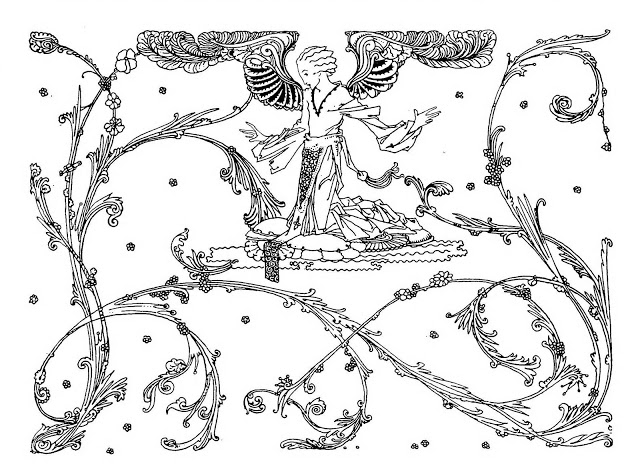
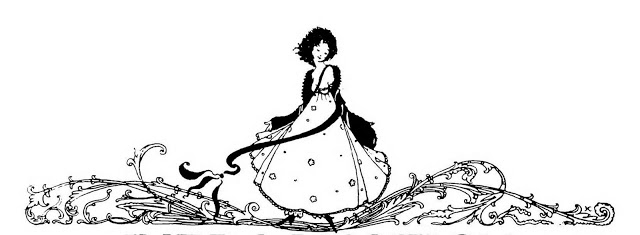
The best poetry is always about the earth itself and all the strange and lovely things that compose and inhabit it. When a 'great poet' sets himself the task of some 'big theme' he needs only to hold, as it were, a magnifying glass to the earth. We who are born and live here like very much to imagine other worlds, and we have even mentally constructed such another in which to exist after dying on this one; but we were careful to make it a glorified version of our own earth, with everything we most love here intensified and improved to the utmost stretch of human imagination.
To each man his 'best poetry' is that which he is able most to enjoy. The first object of poetry is to give pleasure. Pleasure is various, but it cannot exist where the emotions or the imagination have not been powerfully stirred. Whether it be called sensual or intellectual, pleasure cannot be willed. It is impossible to feel happy because one wants to feel happy,[Pg 6] or sad because one wishes to feel sad. But such bodily or mental conditions may be induced from outside through a natural agency such as poetry, or music.
Now those dreary people who would maintain that poetry should deal (some say exclusively) with what they call 'big themes,' or 'the larger life', are merely advocating more use of the magnifying glass as against intensive cultivation of the natural eye. The poet is essentially he who examines carefully, and learns to know fully, every detail of common life. He seeks to name in a variety of manners, and to define, the objects about him, to compare them with other objects, near or remote, and to find, for the mere sake of enjoyment, wonderful varieties of description and comparison. When he imagines better places than his earth, or invents gods, the impersonation and combination of the fortunate qualities in man, he is then using the magnifying glass with talent, occasionally with rare genius. But the poet who seeks, without genius, to magnify is simply a fool who sees everything too big, and boasts, in the loudest voice he can raise, of his diseased eyesight.
One of the peculiarities, or perhaps rather the essential quality, of the lyrical poetry of to-day is a minute concentration on the objects immediately near it and an anxious carefulness to describe these in the most appropriate and satisfactory terms. Thus it is often accused of a neglect to sublimate the emotions, and many critics have been at pains to suggest that this affection for the nearest and that careful[Pg 7] description of natural events denotes a smallness of mental range. Be it noted, however, that the eye which does not look too far often sees most. It is remarkable that English lyrical poetry should have learnt in this period of religious uncertainty to clasp itself at least to a reality that cannot be questioned or doubted. So far its faith reaches. It expresses a trustfulness in what it can definitely perceive, it hardly ventures outside the circles of human daily experience, and in this capacity it reveals an excellence of many kinds, sincerity often, and, at worst, a playfulness which, if ephemeral, is amusing at any rate to those whom it is intended to amuse, and appropriately irritating to those whom it wants to annoy.
But the most noticeable characteristic of the verse of our present moment is its dislike of the aloofness generally associated with English poetry. About twice a century language consolidates: phrases which were once soft and new harden with use; words once of a ringing beauty become dry and hollow through excessive repetition. This state of language is not much noticed by people who have no special use for it beyond the expression of daily needs. Moreover, they make new colloquial words for themselves as required without forethought or difficulty. Poets, however, must consciously search for new words, and a tired condition of their language is to them a great difficulty. The Victorians were absolute spendthrifts of words: no vocabulary could keep pace with their recklessness; they bequeathed a language[Pg 8] almost ruined for sentimental purposes—words and phrases had acquired either such an aloofness that for a long time no one any more would trouble to reach up to them, or had become so thin and common that to use them would have been something like hack-sawing a piece of cotton.
Now in the anthology which follows we may notice a characteristic escape from these difficulties. Words have been brought down from their high places and compelled into ordinary use. This has been accomplished not so much through any new familiarity with the words themselves as by a certain naturalness in the attitude of the people employing them. Rupert Brooke's "Great Lover" is an example.
In short, these are the chief reasons why present-day poetry is readable and entertaining—that it deals with familiar subjects in a familiar manner; that, in doing so, it uses ordinary words literally and as often as possible; that it is not aloof or pretentious; that it refuses to be bullied by tradition: its style, in fact, is itself.
If an excuse is to be sought for the addition of this one more to the large number of existent collections of recent poetry, let it be in the nature of an explanation rather than an apology. Good, or even representative, poetry requires, in fact, no apology, but where the poems of some thirty-two different[Pg 9] authors have been extracted from their books and placed side by side in one collection, a discussion of the apparent aims of the anthologist may be interesting, and will perhaps lead to a fuller enjoyment of the collection thus produced.
Some readers approach a volume of poems to criticize it, others with the object of gaining pleasure. To give pleasure is assuredly the object of this volume. Moreover, it is adapted to the tastes of almost any age, from ten to ninety, and may be read aloud by grandchild to grandparent as suitably as by grandparent to grandchild. It is an anthology of Poems, not of Names. For instance, though Thomas Hardy is on the list, the lyric chosen to represent him is actually more characteristic of the book itself than of the mind of that great and aged poet. It is, in fact, Christian in atmosphere. It is not a typical specimen of Mr Hardy's style. It shows him in that occasional rather sad mood of regret for a lost superstition. It is not the best of Hardy, but rather a poem admirably suited to the book, which also happens, as by chance, to be by the author of "The Dynasts" and "Satires of Circumstance."
The collection as a whole is modern, and all except eight of its authors are living and writing. Of those eight, five died as soldiers in the European War, and are represented mainly by what is known as 'War poetry.' Otherwise such poetry is fortunately absent. This absence may be justified[Pg 10] by the fact that most of the verse written on the subject of the War turns out, surveyed in cooler blood, to be, as any sound judge of literature must always have known, definitely and unmistakably bad. Much of it is by now, or should be, repudiated by its authors. It was too often "the spontaneous overflow of powerful feelings"; it too seldom originated from "emotion recollected in tranquillity."
Rupert Brooke's sonnets "The Dead" and "The Soldier" were popular almost from their first publication. They belong undoubtedly to the best traditions of English poetry. Julian Grenfell's "Into Battle," and, in a lesser, degree, the "Home Thoughts from Laventie" of Edward Wyndham Tennant, have acquired popularity among a larger number of folk than can be included in the general term 'literary circles.' Neither of the composers of these verses was a professional poet. Both were men of attractive personality and strong feeling, with education, taste, and an occasional impulse to write gracefully. Intrinsically either poem might as easily have been inspired by an Indian frontier raid as by a European war. They do not affect the traditions of English poetry by subject or by form. It will be found, as the years pass, that always fewer 'War poems' can still be read with pleasure, the incidents which gave rise to them having become dim in human memory. And these will not be read because of their association with the Great War, but for their qualities as poems and their power to stir enjoyment or surprise in the reader.
Consider those four melancholy lines by which Edward Thomas is here represented, remarkable for their concentration and for the crowd of images they can suggest. At present the words "where all that passed are dead" alone associate this poem with the War. But death comes through so many causes that twenty years from now a footnote would be needed if it were desired to emphasize that association.
J.E. Flecker's "Dying Patriot," one of his three poems in this book, was written in 1914 in Switzerland, where he was dying of consumption. It is certainly less a 'War poem' than the same author's "War Song of the Saracens."
The verses entitled "A Petition," by R. E. Vernède, are of a different kind. They are written in conventional Henley-Kiplingese, and contain too many incidents of a type of poetic expression that has been used to excess, as "wider than all seas," "to front the world," "quenchless hope" "All that a man might ask thou hast given me, England!" They are, nevertheless, useful in the collection as a set-off against the other 'War poems' and an instance of the more ephemeral type of patriotic verse.
Thus it would appear that the anthologist has displayed wisdom when including in this volume only few pieces that may be associated with the War, and those few (with one exception) on the score of their literary merit, and for no other reason.
Poets of to-day write individually less than their pre-decessors, and most of them are satisfied to publish only a proportion of what they write. None of the eight referred to above left us any great bulk of verse. Four at least, however, are becoming daily better known to the reading public, and of these Rupert Brooke and J. E. Flecker have already their dozens of conscious or unconscious imitators. The form, rhythm, or Eastern atmosphere of Fleckers poetry, the cynicism and wit of Brooke's, recur somewhat diluted in the verse of almost every young undergraduate. Neither Lionel Johnson nor Mary Coleridge has ever become so well known or received so much attention from the average plagiarist, while the reputation of Edward Thomas has been of slow and uncertain growth. Johnsons poetry is too intellectual for the average reader. The wonderful, small lyrics of Mary Coleridge are esoteric rather than general. Nevertheless, this anthology includes, most advisedly, a good poem by Johnson, one indeed which has had a quiet, but strong, influence on modern lyrical poetry, namely, the lines to the statue of King Charles at Charing Cross, and also a charming impression by Mary Coleridge.
"Street Lanterns" is a good example of that poetry of close observation to which reference has already been made. It is a small, careful description of a London scene. It assumes that the reader has observed as much, and that he[Pg 13] will enjoy to be reminded and brought back for a moment in imagination to autumn and street-mending. The advocate of 'big themes' will inevitably condemn such verse, for the poet has aimed at neither size nor grandeur, has indeed sought rather to diminish her subject than enlarge it.
This anthology, it has been remarked above, is one rather of particular poems than of well-known authors. Several names of repute are not to be found in the index. William Watson is only represented by "April," a little catch that might come to any man of feeling on a spring walk. To think in terms of these verses is at once not to mind having left an umbrella at home. Hilaire Belloc gives a sharp impression of early rising; he also sings in a great voice all the glories of his favourite part of England. W. H. Davies brings sheep across the Atlantic, and he talks to a kingfisher. Mrs Meynell contributes "The Shepherdess," that well-known description of a fine and serene mind, also two London poems, of which one is the lovely "November Blue." John Masefield is not to be read in his best style, but the three poems we find here are thoroughly English, full of the love of the island soil and of its sea, and are probably in the book for that reason. So much for some of the well-known contributors. Side by side with them we find the unknown name of H. H. Abbott, whose "Black and White" is a sketch of remarkable clarity and interest.
Death, so favourite a subject with poets, is seldom allowed to figure in this book. Betsey-Jane would insist on going to Heaven, but is told, in the charming verses by Helen Parry Eden, that it simply "would not do." The whole book is too full of pleasure and the experience of being alive: Betsey-Jane should read it. She might remember all her life the advice given on page 117, and be saved hundreds of pounds in lawyers' bills when she is grown up.
Let the reader turn to page 114. Here is the style in which good poetry prefers to teach, and by which it achieves more in eleven lines than a Martin Tupper in 11,000. Mr Pepler has written down only one sentence, charmingly improved by a series of most natural rhymes. It is a very nasty hit at the lawyer. He does not tell him he is not a 'gentleman', or anything so strong as that. He pays him what might be taken for a compliment. He assumes that he does understand his own job. Then he enumerates the things he does not understand. He attaches no blame: he makes a statement only; one that the lawyer certainly will not think worth arguing about, but that his client may advisedly take to heart.
Ralph Hodgson's "Stupidity Street" argues in somewhat the same manner. It does not suggest that anyone should become vegetarian, or that it is wrong to kill birds. It names a street and gives a reason for doing so. It is an angry little Poem, but impersonal.
"The Bells of Heaven," by the same author, simply chances[Pg 15] a hint that something might happen if something else did. It is a suggestion only, but made by one who knows what he thinks, and how to think it. Into a few lines a whole philosophy is concentrated.
Thus Pepler or Ralph Hodgson nudge peoples arms and draw attention to traditional stupidities.
Walter De la Mare puts the children to sleep with "Nod," or bewitches them with the Mad Prince's Song; or he takes us to an Arabia which never existed, but is one of those countries more beautiful than any we know, and therefore we love to imagine it.
Look at that full moon on page 53, which Dick saw "one night." Here is the possible experience of man, woman, child, dog, fox, bear—or even nightingale—all concentrated into the shortest and plainest account of something that happened to Dick. He and Betsey-Jane, though quite different in kind, belong to the same world. Betsey-Jane is plainly more romantic than Dick.
But, talking of the moon, we may turn back to Mr Chesterton on page 36. Here we find something incongruous in the collection: a poem that wishes deliberately to strike a note. The donkey is a much better fellow than Mr Chesterton seems to think: he does not ask for glorification, nor would he utter that boast of the last two lines. Would a man not rather "go with the wild asses to Paradise" than have the case for the donkey pleaded before him in this obtrusive manner?
Turn back four pages and you will find:
For the good are always the merry,
Save by an evil chance,
And the merry love the fiddle,
And the merry love to dance.
This, by W. B. Yeats, represents a much pleasanter type of thought. In these verses of the Irish poet we have the gaiety of a man who, knowing all about religion, can afford not to be sentimental. And here is the spirit of the book.
The happiness of those who love the earth is so different from the pleasure by proxy of those that abide it in the idea of going to some Heaven afterward. Mr Yeats' "Fiddler of Dooney" is that type of fellow who accepts the symbolism of a national religion only in so far as it may help him to enjoy the condition of being alive. And in his "Lake Isle of Innisfree" he imagines a Paradise which is of the earth only. And he takes you there by reason of his own longing.
This anthology, as a whole, is romantic ; its language is simple; its philosophy is that of everyday life, and is entirely undisturbing. It contains a large proportion of poems by authors who write more particularly for children, such as P. R. Chalmers, Rose Fyleman, Queenie Scott-Hopper, and Marion St John Webb, or of children's poems by authors who do not actually specialize in that style, such as "The Ragwort,"[Pg 17] by Frances Cornford; "Cradle Song," by Sarojini Naidu; "Check," by James Stephens, and others. Two of its authors remain necessarily unmentioned here, namely, the compiler of the book and the writer of this Introduction.
Some people make it their business to pick anthologies to pieces, and they seem to enjoy themselves. "Why is this included?" they cry; "Why is that left out?"—a form of criticism nearly always beside the point. Inclusion or exclusion is in the taste and discretion of the anthologist.
This Introduction may, it is hoped, stimulate the reader of the poems which follow to think about them carefully in their relation to each other, and in their relation to English poetry as a whole. For though it has frequently been emphasized that the object of poetry (and particularly of lyrical poetry) is to give pleasure, it should nevertheless be added that intellectual pleasure cannot be gathered at random, or without certain preparation of the mind to receive it.
HAROLD MONRO

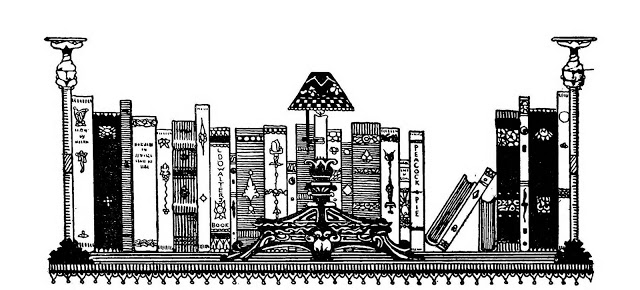
For permission to use copyright poems the Editor is indebted to :
The Authors—H. H. Abbott, Hilaire Belloc, P. R. Chalmers, G. K. Chesterton, Frances Cornford, W. H. Davies, Walter De la Mare, John Drinkwater, Rose Fyleman, W. W. Gibson, Robert Graves, Ralph Hodgson, Teresa Hooley, Margaret Mackenzie, Irene R. McLeod, John Masefield, Alice Meynell, Harold Monro, Sarojini Naidu, H. D. C. Pepler, James Stephens, Sir William Watson, Marion St John Webb, and W. B. Yeats.
The Literary Executors of Rupert Brooke, Mary E. Coleridge (Sir Henry Newbolt), James Elroy Flecker (Mrs Flecker), Julian Grenfell (Lady Desborough), Lionel Johnson (Mr Elkin Mathews), Edward Wyndham Tennant (Lady Glenconner), Edward Thomas (Messrs Selwyn and Blount), R. E. Vernède.
And the following Publishers, in respect of the poems selected :
Messrs Burns and Oates, Ltd.
Alice Meynell: Collected Poems.
Messrs Constable and Co., Ltd.
Walter De la Mare: The Listeners, Peacock Pie.
Messrs J. M. Dent and Sons, Ltd.
[Pg 20]G. K. Chesterton: The Wild Knight.
Messrs Duckworth and Co.
Hilaire Belloc: Verses.
Mr A. C. Fifield
W. H. Davies: Collected Poems.
Messrs George G. Harrap and Co., Ltd.
E. J. Brady: The House of the Winds.
Queenie Scott-Hopper: Pull the Bobbin!
Marion St John Webb: The Littlest One.
Mr W. Heinemann, London, and the John Lane Company, New York
Sarojini Naidu: The Golden Threshold.
Messrs Houghton Mifflin Company, Boston
John Drinkwater: Poems by John Drinkwater.
Mr John Lane, London, and the John Lane Company, New York
Helen Parry Eden Bread and Circuses.
Edward Wyndham Tennant, by Pamela Glenconner.
Messrs Macmillan and Co., Ltd., London, and the Macmillan Company, New York
W. W. Gibson: Whin.
Ralph Hodgson: Poems.
J. Stephens: The Adventures of Seumas Beg, Songs from the Clay.
W. B. Yeats: Poems: Second Series.
The Macmillan Company, New York
John Masefield: Ballads and Poems.
Messrs Maunsel and Co.
P. R. Chalmers: Green Days and Blue Days.
Messrs Methuen and Co., Ltd.
Rose Fyleman: Fairies and Chimneys, The Fairy Green.
The Poetry Bookshop
H. H. Abbott: Black and White.
Frances Cornford: Spring Morning.
[Pg 21]R. Graves: Over the Brazier.
Messrs Sands and Co.
M. Mackenzie: The Station Platform, and Other Poems.
Mr Martin Seeker
J. E. Flecker: Collected Poems.
Francis Brett Young: Poems, 1916-1918.
Messrs Selwyn and Blount, London, and Messrs Henry Holt and Company, New York
Edward Thomas: Poems.
Messrs Sidgwick and Jackson, Ltd.
J. Redwood Anderson: Walls and Hedges.
John Drinkwater: Swords and Ploughshares.
Messrs Sidgwick and Jackson, Ltd., and the John Lane Company, New York
Rupert Brooke: 1914, and Other Poems.
Messrs T. Fisher Unwin, Ltd.
W. B. Yeats: Poems.
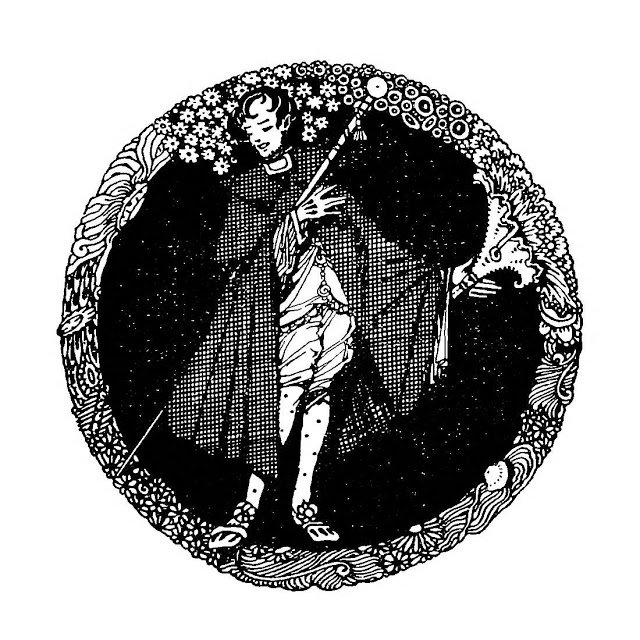
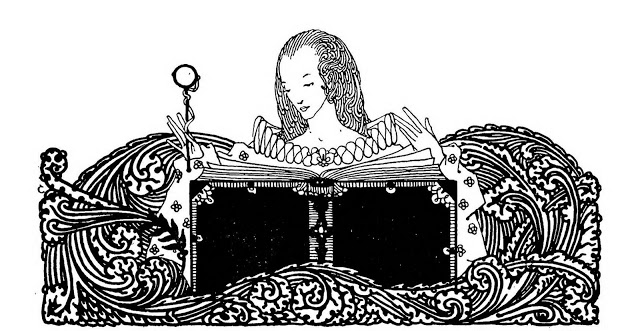
ARRANGED UNDER NAMES OF AUTHORS
ABBOTT, H. H.
Black and White 126
ANDERSON, J. REDWOOD
The Bridge 118
BELLOC, HILAIRE
The Early Morning 37
The South Country 38
BRADY, E. J.
A Ballad of the Captains 47
BROOKE, RUPERT
The Dead 60
The Great Lover 61
The Soldier 65
[Pg 24]
CHALMERS, P. R.
If I had a Broomstick 74
Roundabouts and Swings 75
CHESTERTON, G. K.
The Donkey 36
COLERIDGE, MARY E.
Street Lanterns 116
CORNFORD, FRANCES
In France 71
The Ragwort 72
DAVIES, W. H.
The Kingfisher 85
Sheep 86
DE LA MARE, WALTER
Arabia 51
Full Moon 53
Nod 54
The Song of the Mad Prince 56
DRINKWATER, JOHN
A Town Window 78
EDEN, HELEN PARRY
To Betsey-Jane, on her Desiring to go
[Pg 25]
Incontinently to Heaven 117
FLECKER, JAMES E.
Brumana 79
The Dying Patriot 80
November Eves 82
FYLEMAN, ROSE
Alms in Autumn 105
I Don't Like Beetles 107
Wishes 108
GIBSON, W. W.
Sweet as the Breath of the Whin 113
GRAVES, ROBERT
Star-Talk 83
GRENFELL, JULIAN
Into Battle 91
HARDY, THOMAS
The Oxen 128
HODGSON, RALPH
The Bells of Heaven 99
The Song of Honour 100
Stupidity Street 102
HOOLEY, TERESA
Sea-Foam 123
JOHNSON, LIONEL
By the Statue of King Charles at
[Pg 26]
Charing Cross 66
MACKENZIE, MARGARET
To the Coming Spring 103
MCLEOD, IRENE R.
Lone Dog 73
MASEFIELD, JOHN
Sea Fever 41
Tewkesbury Road 43
The West Wind 45
MEYNELL, ALICE
A Dead Harvest 57
November Blue 58
The Shepherdess 59
MONRO, HAROLD
Overheard on a Saltmarsh 94
A Flower is Looking through the Ground 96
Man Carrying Bale 97
NAIDU, SAROJINI
Cradle-Song 35
PEPLER, H. D. C.
The Law the Lawyers Know About 114
SCOTT-HOPPER, QUEENIE
Very Nearly! 109
[Pg 27]
What the Thrush Says 110
STEPHENS, JAMES
Check 69
When the Leaves Fall 70
TENNANT, E. W.
Home Thoughts in Laventie 88
THOMAS, E.
The Cherry Trees 98
VERNÈDE, R. E.
A Petition 124
WALTERS, L. D'O.
All is Spirit and Part of Me 115
WATSON, SIR WILLIAM
April 31
WEBB, MARION ST JOHN
The Sunset Garden 112
YEATS, W. B.
The Fiddler of Dooney 32
The Lake Isle of Innisfree 34
YOUNG, FRANCIS BRETT
February 121

The Lake Isle of Innisfree. Frontispiece
April 31
The Fiddler of Dooney 32
Cradle-Song 35
The Donkey 36
Sea Fever 41
A Ballad of the Captains 47,48
Arabia 51
The Song of the Mad Prince 56
The Shepherdess 59
The Dead 60
The Great Lover 62, 64
If I had a Broomstick 74
[Pg 30]
The Dying Patriot80, 82
Star-Talk 84
Overheard on a Saltmarsh 94
To the Coming Spring 103
Alms in Autumn 106
Very Nearly! 109
All is Spirit and Part of Me 115
Black and White 126
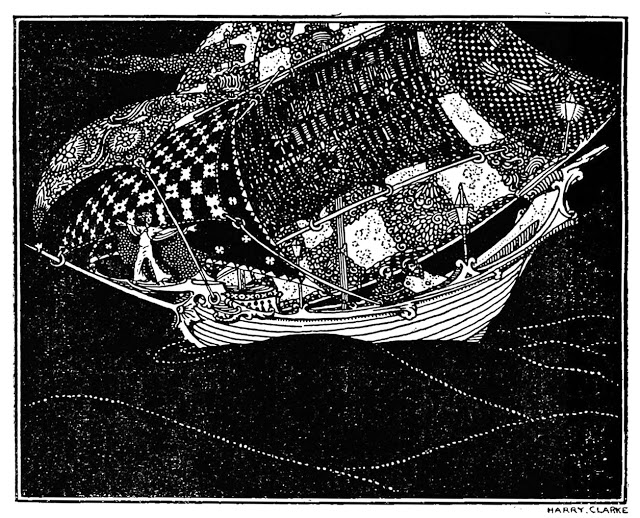
APRIL
April, April,
Laugh thy girlish laughter;
Then, the moment after,
Weep thy girlish tears!
April, that mine ears
If I tell thee, sweetest,
All my hopes and fears,
April, April,
Laugh thy golden laughter,
But, the moment after,
Weep thy golden tears.
WILLIAM WATSON
THE FIDDLER OF DOONEY
When I play on my fiddle in Dooney,
Folk dance like a wave of the sea;
My cousin is priest in Kilvarnet,
My brother in Moharabuiee.
I passed my brother and cousin:
They read in their books of prayer;
I read in my book of songs
I bought at the Sligo fair.
When we come at the end of time,
To Peter sitting in state,
He will smile on the three old spirits,
But call me first through the gate;
For the good are always the merry,
Save by an evil chance,
And the merry love the fiddle,
And the merry love to dance:
And when the folk there spy me,
They will all come up to me,
With "Here is the fiddler of Dooney!"
And dance like a wave of the sea.
W. B. YEATS
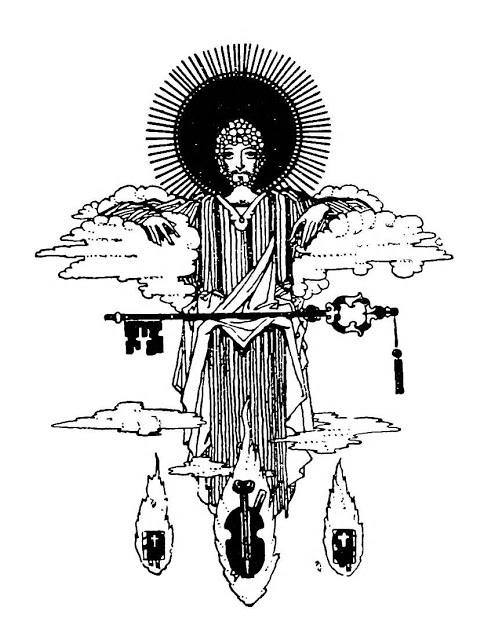
THE LAKE ISLE OF INNISFREE
I will arise and go now, and go to Innisfree,
And a small cabin build there, of clay and wattles made;
Nine bean rows will I have there, a hive for the honey bee,
And live alone in the bee-loud glade.
And I shall have some peace there, for peace comes dropping slow,
Dropping from the veils of the morning to where the cricket sings;
There midnight's all a glimmer, and noon a purple glow,
And evening full of the linnet's wings.
I will arise and go now, for always, night and day,
I hear lake-water lapping with low sounds by the shore;
While I stand on the roadway, or on the pavements grey,
I hear it in the deep heart's core.
W. B. YEATS
CRADLE-SONG
From groves of spice,
O'er fields of rice,
Athwart the lotus-stream,
I bring for you,
Aglint with dew,
A little lovely dream.
Sweet, shut your eyes,
The wild fire-flies
Dance through the fairy neem;[1]
From the poppy-bole
For you I stole
A little lovely dream.
Dear eyes, good-night,
In golden light
The stars around you gleam;
On you I press
With soft caress
A little lovely dream.
SAROJINI NAIDU
[1] A lilac-tree (Hindustani).
THE DONKEY
When fishes flew and forests walked
And figs grew upon thorn,
Some moment when the moon was blood
Then surely I was born;
With monstrous head and sickening cry
And ears like errant wings,
The devil's walking parody
On all four-footed things.
The tattered outlaw of the earth,
Of ancient crooked will;
Starve, scourge, deride me: I am dumb,
I keep my secret still.
Fools! For I also had my hour;
One far fierce hour and sweet:
There was a shout about my ears,
And palms before my feet.
G. K. CHESTERTON
THE EARLY MORNING
The moon on the one hand, the dawn on the other:
The moon is my sister, the dawn is my brother.
The moon on my left and the dawn on my right.
My brother, good morning: my sister, good night.
HILAIRE BELLOC
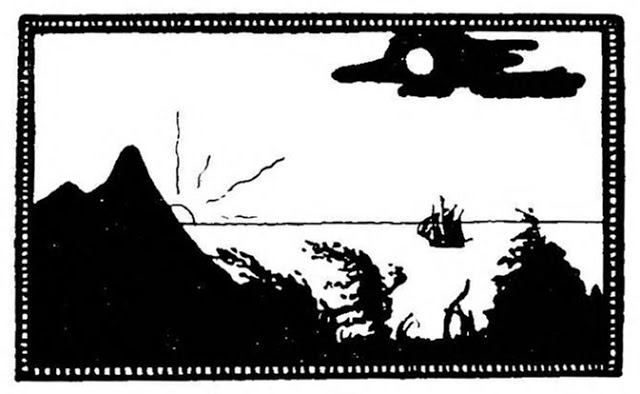
THE SOUTH COUNTRY
When I am living in the Midlands
That are sodden and unkind,
I light my lamp in the evening:
My work is left behind;
And the great hills of the South Country
Come back into my mind.
The great hills of the South Country
They stand along the sea;
And it's there walking in the high woods
That I could wish to be,
And the men that were boys when I was a boy
Walking along with me.
The men that live in North England
I saw them for a day:
Their hearts are set upon the waste fells,
Their skies are fast and grey;
From their castle-walls a man may see
[Pg 39]The mountains far away.
The men that live in West England
They see the Severn strong,
A-rolling on rough water brown
Light aspen leaves along.
They have the secret of the Rocks,
And the oldest kind of song.
But the men that live in the South Country
Are the kindest and most wise,
They get their laughter from the loud surf,
And the faith in their happy eyes
Comes surely from our Sister the Spring
When over the sea she flies;
The violets suddenly bloom, at her feet,
She blesses us with surprise.
I never get between the pines
But I smell the Sussex air;
Nor I never come on a belt of sand
But my home is there.
And along the sky the line of the Downs
So noble and so bare.
A lost thing could I never find,
[Pg 40]Nor a broken thing mend:
And I fear I shall be all alone
When I get towards the end.
Who will be there to comfort me
Or who will be my friend?
I will gather and carefully make my friends
Of the men of the Sussex Weald,
They watch the stars from silent folds,
They stiffly plough the field.
By them and the God of the South Country
My poor soul shall be healed.
If I ever become a rich man,
Or if ever I grow to be old,
I will build a house with deep thatch
To shelter me from the cold,
And there shall the Sussex songs be sung
And the story of Sussex told.
I will hold my house in the high wood
Within a walk of the sea,
And the men that were boys when I was a boy
Shall sit and drink with me.
HILAIRE BELLOC
SEA FEVER
I must go down to the seas again, to the lonely sea and the sky,
And all I ask is a tall ship and a star to steer her by;
And the wheel's kick and the wind's song and the white sail's shaking,
And a grey mist on the sea's face, and a grey dawn breaking.
I must go down to the seas again, for the call of the running tide
Is a wild call and a clear call that may not be denied;
And all I ask is a windy day with the white clouds flying,
And the flung spray "and the blown spume, and the sea-gulls crying.
[Pg 42]I must go down to the seas again, to the vagrant gipsy life,
To the gull's, way and the whale's way where the wind's like a whetted
knife;
And all I ask is a merry yarn from a laughing fellow-rover,
And quiet sleep and a sweet dream when the long trick's over.
JOHN MASEFIELD
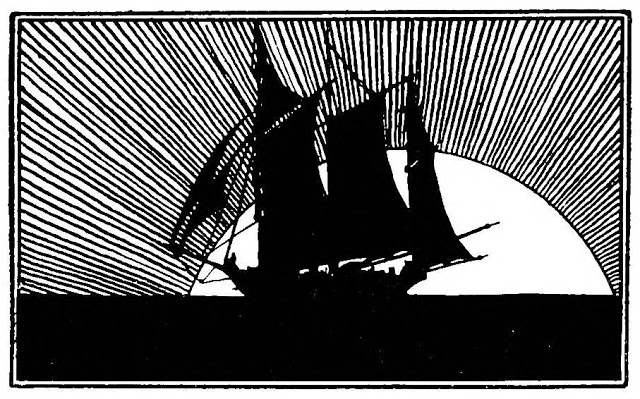
TEWKESBURY ROAD
It is good to be out on the road, and going one knows not where,
Going through meadow and village, one knows not whither nor why;
Through the grey light drift of the dust, in the keen cool rush
of the air,
Under the flying white clouds, and the broad blue lift of the sky.
And to halt at the chattering brook, in the tall green fern at the brink
Where the harebell grows, and the gorse, and the foxgloves purple and
white;
Where the shy-eyed delicate deer come down in a troop to drink
When the stars are mellow and large at the coming on of the night.
[Pg 44]O, to feel the beat of the rain, and the homely smell of the earth,
Is a tune for the blood to jig to, a joy past power of words;
And the blessed green comely meadows are all a-ripple with mirth
At the noise of the lambs at play and the dear wild cry of the birds.
JOHN MASEFIELD
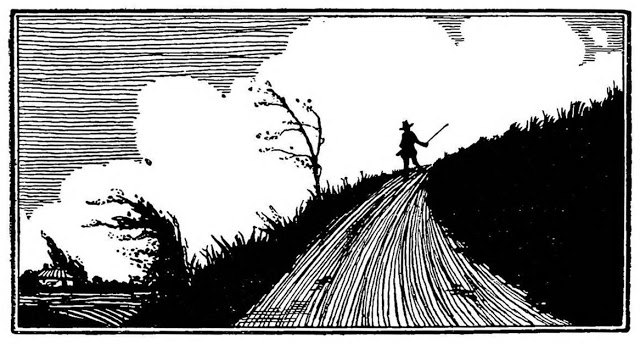
THE WEST WIND
It's a warm wind, the west wind, full of birds' cries;
I never hear the west wind but tears are in my eyes.
For it comes from the west lands, the old brown hills,
And April's in the west wind, and daffodils.
It's a fine land, the west land, for hearts as tired as mine,
Apple orchards blossom there, and the air's like wine.
There is cool green grass there, where men may lie at rest,
And the thrushes are in song there, fluting from the nest.
"Will you not come home, brother? You have been long away.
It's April, and blossom time, and white is the spray:
And bright is the sun, brother, and warm is the rain,
[Pg 46]Will you not come home, brother, home to us again?
The young corn is green, brother, where the rabbits run;
It's blue sky, and white clouds, and warm rain and sun.
It's song to a man's soul, brother, fire to a man's brain,
To hear the wild bees and see the merry spring again.
Larks are singing in the west, brother, above the green wheat,
So will you not come home, brother, and rest your tired feet?
I've a balm for bruised hearts, brother, sleep for aching eyes,"
Says the warm wind, the west wind, full of birds' cries.
It's the white road westwards is the road I must tread
To the green grass, the cool grass, and rest for heart and head,
To the violets and the brown brooks and the thrushes' song
In the fine land, the west land, the land where I belong.
JOHN MASEFIELD
A BALLAD OF THE CAPTAINS
Where are now the Captains
Of the narrow ships of old—
Who with valiant souls went seeking
For the Fabled Fleece of Gold;
In the clouded Dusk of Ages,
In the Dawn of History;
When the ringing songs of Homer
First re-echoed o'er the Sea?
Oh, the Captains lie a-sleeping
Where great iron hulls are sweeping
Out of Suez in their pride;
And they hear not, and they heed not,
And they know not, and they need not
In their deep graves far and wide.
Where are now the Captains
Who went blindly through the Strait,
With a tribute to Poseidon,
[Pg 48]A libation poured to Fate?
They were heroes giant-hearted,
That with Terrors, told and sung,
Like blindfolded lions grappled,
When the World was strange and young.
Oh, the Captains brave and daring,
With their grim old crews are faring
Where our guiding beacons gleam;
And the homeward liners o'er them—
All the charted seas before them—
Shall not wake them as they dream.
Where are now the Captains
From bold Nelson back to Drake,
Who came drumming up the Channel,
Haling prizes in their wake?
Where are England's fighting Captains
Who, with battle-flags unfurled,
Went a-rieving all the rievers
O'er the waves of all the world?
Oh, these Captains, all confiding
In the strong right hand, are biding
In the margins, on the Main;
They are shining bright in story,
They are sleeping deep in glory,
On the silken lap of Fame.
Here are now the Captains
Who regarded not the tears
Of the captured Christian maidens
Carried, weeping, to Algiers?
Yes, the swarthy Moorish Captains,
Storming wildly 'cross the Bay,
With a dead hidalgo's daughter.
As a dower for the Dey?
Oh, those cruel Captains never
Shall sweet lovers more dissever,
On their forays as they roll;
Or the mad Dons curse them vainly,
As their baffled ships, ungainly,
Heel them, jeering, to the Mole.
Where are now the Captains
Of those racing, roaring days,
Who of knowledge and of courage,
Drove the clippers on their ways—
To the furthest ounce of pressure,
To the latest stitch of sail,
'Carried on' before the tempest
[Pg 50]Till the waters lapped the rail?
Oh, the merry, manly skippers
Of the traders and the clippers,
They are sleeping East and West,
And the brave blue seas shall hold them,
And the oceans five enfold them
In the havens where they rest.
Where are now the Captains
Of the gallant days agone?
They are biding in their places,
And the Great Deep bears no traces
Of their good ships passed and gone.
They are biding in their places,
Where the light of God's own grace is,
And the Great Deep thunders on.
Yea, with never port to steer for,
And with never storm to fear for,
They are waiting wan and white,
And they hear no more the calling
Of the watches, or the falling
Of the sea rain in the night.
E. J. BRADY
ARABIA
Far are the shades of Arabia,
Where the Princes ride at noon,
'Mid the verdurous vales and thickets,
Under the ghost of the moon;
And so dark is that vaulted purple
Flowers in the forest rise
And toss into blossom 'gainst the phantom stars
Pale in the noonday skies.
Sweet is the music of Arabia
In my heart, when out of dreams
I still in the thin clear mirk of dawn
Descry her gliding streams;
Hear her strange lutes on the green banks
Ring loud with the grief and delight
Of the demi-silked, dark-haired Musicians
In the brooding silence of night.
They haunt me—her lutes and her forests;
No beauty on earth I see
But shadowed with that dream recalls
[Pg 52]Her loveliness to me:
Still eyes look coldly upon me,
Cold voices whisper and say—
"He is crazed with the spell of far Arabia,
They have stolen his wits away."
WALTER DE LA MARE
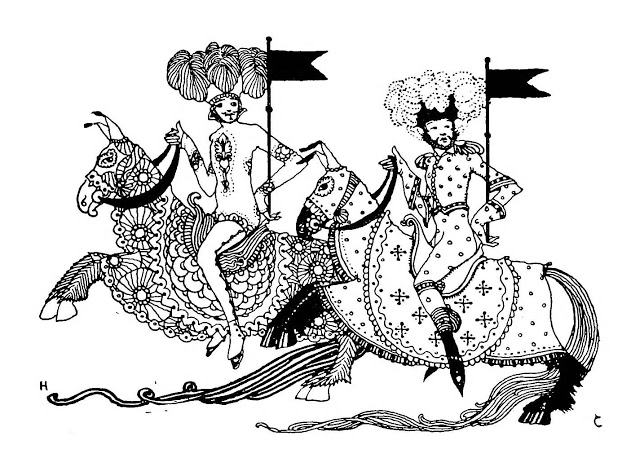
FULL MOON
One night as Dick lay half asleep,
Into his drowsy eyes
A great still light began to creep
From out the silent skies.
It was the lovely moon's, for when
He raised his dreamy head,
Her rays of silver filled the pane
And streamed across his bed.
So, for awhile, each gazed at each—
Dick and the solemn moon—
Till, climbing slowly on her way,
She vanished, and was gone.
WALTER DE LA MARE
NOD
Softly along the road of evening,
In a twilight dim with rose,
Wrinkled with age, and drenched with dew,
Old Nod, the shepherd, goes.
His drowsy flock streams on before him,
Their fleeces charged with gold,
To where the sun's last beam leans low
On Nod the shepherd's fold.
The hedge is quick and green with briar,
From their sand the conies creep;
And all the birds that fly in heaven
Flock singing home to sleep.
His lambs outnumber a noon's roses,
Yet, when night's shadows fall,
His blind old sheep-dog, Slumber-soon,
[Pg 55]Misses not one of all.
His are the quiet steeps of dreamland,
The waters of no-more-pain,
His ram's bell rings 'neath an arch of stars,
"Rest, rest, and rest again."
WALTER DE LA MARE
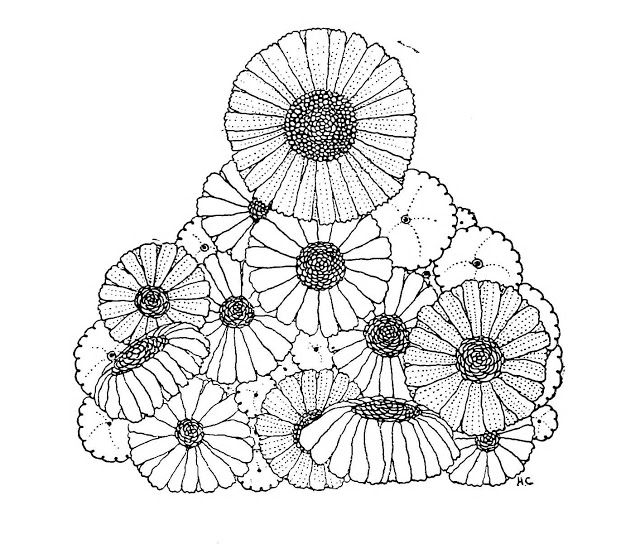
THE SONG OF THE MAD PRINCE
Who said, "Peacock Pie"?
The old King to the sparrow:
Who said, "Crops are ripe"?
Rust to the harrow:
Who said, "Where sleeps she now?
Where rests she now her head,
Bathed in eve's loveliness"?
That's what I said.
Who said, "Ay, mum's the word"?
Sexton to willow:
Who said, "Green dusk for dreams,
Moss for a pillow"?
Who said, "All Time's delight
Hath she for narrow bed;
Life's troubled bubble broken"?
That's what I said.
WALTER DE LA MARE
A DEAD HARVEST
IN KENSINGTON GARDENS
Along the graceless grass of town
They rake the rows of red and brown,—
Dead leaves, unlike the rows of hay
Delicate, touched with gold and grey,
Raked long ago and far away.
A narrow silence in the park,
Between the lights a narrow dark.
One street rolls on the north; and one,
Muffled, upon the south doth run;
Amid the mist the work is done.
A futile crop! for it the fire
Smoulders, and, for a stack, a pyre.
So go the town's lives on the breeze,
Even as the sheddings of the trees;
Bosom nor barn is filled with these.
ALICE MEYNELL
NOVEMBER BLUE
The golden tint of the electric lights seems to give a complementary
colour to the air in the early evening.
Essay on London
O heavenly colour, London town
Has blurred it from her skies;
And, hooded in an earthly brown,
Unheaven'd the city lies.
No longer standard-like this hue
Above the broad road flies;
Nor does the narrow street the blue
Wear, slender pennon-wise.
But when the gold and silver lamps
Colour the London dew,
And, misted by the winter damps,
The shops shine bright anew—
Blue comes to earth, it walks the street,
It dyes the wide air through;
A mimic sky about their feet,
The throng go crowned with blue.
ALICE MEYNELL
THE SHEPHERDESS
She walks—the lady of my delight—
A shepherdess of sheep.
Her flocks are thoughts. She keeps them white;
She guards them from the steep;
She feeds them on the fragrant height,
And folds them in for sleep.
She roams maternal hills and bright,
Dark valleys safe and deep,
Into that tender breast at night
The chastest stars may peep.
She walks—the lady of my delight—
A shepherdess of sheep.
She holds her little thoughts in sight,
Though gay they run and leap.
She is so circumspect and right;
She has her soul to keep.
She walks—the lady of my delight—
A shepherdess of sheep.
ALICE MEYNELL
THE DEAD
Blow out, you bugles, over the rich Dead!
There's none of these so lonely and poor of old,
But, dying, has made us rarer gifts than gold.
These laid the world away; poured out the red
Sweet wine of youth; gave up the years to be
Of work and joy, and that unhoped serene,
That men call age; and those who would have been,
Their sons, they gave, their immortality.
Blow, bugles, blow! They brought us, for our dearth,
Holiness, lacked so long, and Love, and Pain.
Honour has come back, as a king, to earth,
And paid his subjects with a royal wage;
And Nobleness walks in our ways again;
And we have come into our heritage.
RUPERT BROOKE
THE GREAT LOVER
I have been so great a lover: filled my days
So proudly with the splendour of Love's praise,
The pain, the calm, and the astonishment,
Desire illimitable, and still content,
And all dear names men use, to cheat despair,
For the perplexed and viewless streams that bear
Our hearts at random down the dark of life.
Now, ere the unthinking silence on that strife
Steals down, I would cheat drowsy Death so far,
My night shall be remembered for a star
That outshone all the suns of all men's days.
Shall I not crown them with immortal praise
Whom I have loved, who have given me, dared with me
High secrets, and in darkness knelt to see
The inenarrable godhead of delight?
Love is a flame;—we have beaconed the world's night.
A city:—and we have built it, these and I.
[Pg 62]An emperor:—we have taught the world to die.
So, for their sakes I loved, ere I go hence,
And the high cause of Love's magnificence,
And to keep loyalties young, I'll write those names
Golden for ever, eagles, crying flames,
And set them as a banner, that men may know,
To dare the generations, burn, and blow
Out on the wind of Time, shining and streaming....
These I have loved:
White plates and cups, clean-gleaming,
Ringed with blue lines; and feathery, faery dust;
Wet roofs, beneath the lamp-light; the strong crust
Of friendly bread; and many-tasting food;
Rainbows; and the blue bitter smoke of wood;
And radiant raindrops couching in cool flowers;
And flowers themselves, that sway through sunny hours,
Dreaming of moths that drink them under the moon;
Then, the cool kindliness of sheets, that soon
Smooth away trouble; and the rough male kiss
Of blankets; grainy wood; live hair that is
Shining and free; blue-massing clouds; the keen
Unpassioned beauty of a great machine;
The benison of hot water; furs to touch;
The good smell of old clothes; and other such—
The comfortable smell of friendly fingers,
Hair's fragrance, and the musty reek that lingers
About dead leaves and last year's ferns....
Dear names,
And thousand other throng to me! Royal flames;
Sweet water's dimpling laugh from tap or spring;
Holes in the ground; and voices that do sing;
Voices in laughter, too; and body's pain,
Soon turned to peace; and the deep-panting train;
Firm sands; the little dulling edge of foam
That browns and dwindles as the wave goes home;
And washen stones, gay for an hour; the cold
Graveness of iron; moist black earthen mould;
Sleep; and high places; footprints in the dew;
And oaks; and brown horse-chestnuts, glossy-new;—
And new-peeled sticks; and shining pools on grass;—
All these have been my loves. And these shall pass.
Whatever passes not, in the great hour,
Nor all my passion, all my prayers, have power
To hold them with me through the gate of Death.
They'll play deserter, turn with the traitor breath,
Break the high bond we made, and sell Love's trust
And sacramented covenant to the dust.
—Oh, never a doubt but, somewhere, I shall wake,
[Pg 64]
And give what's left of love again, and make
New friends, now strangers....
But the best I've known,
Stays here, and changes, breaks, grows old, is blown
About the winds of the world, and fades from brains
Of living men, and dies.
Nothing remains.
O dear my loves, O faithless, once again
This one last gift I give: that after men
Shall know, and later lovers, far-removed,
Praise you, "All these were lovely"; say, "He loved."
RUPERT BROOKE
THE SOLDIER
If I should die, think only this of me:
That there's some corner of a foreign field
That is for ever England. There shall be
In that rich earth a richer dust concealed;
A dust whom England bore, shaped, made aware,
Gave, once, her flowers to love, her ways to roam,
A body of England's, breathing English air,
Washed by the rivers, blest by suns of home.
And think, this heart, all evil shed away,
A pulse in the eternal mind, no less
Gives somewhere back the thoughts by England given;
Her sights and sounds; dreams happy as her day;
And laughter, learnt of friends; and gentleness,
In hearts at peace, under an English heaven.
RUPERT BROOKE
BY THE STATUE OF KING CHARLES AT CHARING CROSS
Sombre and rich, the skies;
Great glooms, and starry plains.
Gently the night wind sighs;
Else a vast silence reigns.
The splendid silence clings
Around me: and around
The saddest of all kings
Crowned, and again discrowned.
Comely and calm, he rides
Hard by his own Whitehall:
Only the night wind glides:
No crowds, nor rebels, brawl.
Gone, too, his Court; and yet,
The stars his courtiers are:
Stars in their stations set;
[Pg 67]And every wandering star.
Alone he rides, alone,
The fair and fatal king:
Dark night is all his own,
That strange and solemn thing.
Which are more full of fate:
The stars; or those sad eyes?
Which are more still and great:
Those brows; or the dark skies?
Although his whole heart yearn
In passionate tragedy:
Never was face so stern
With sweet austerity.
Vanquished in life, his death
By beauty made amends:
The passing of his breath
Won his defeated ends.
Brief life and hapless? Nay:
Through death, life grew sublime.
Speak after sentence? Yea:
And to the end of time.
Armoured he rides, his head
[Pg 68]Bare to the stars of doom:
He triumphs now, the dead,
Beholding London's gloom.
Our wearier spirit faints,
Vexed in the world's employ:
His soul was of the saints;
And art to him was joy.
King, tried in fires of woe
Men hunger for thy grace:
And through the night I go,
Loving thy mournful face.
Yet when the city sleeps;
When all the cries are still:
The stars and heavenly deeps
Work out a perfect will.
LIONEL JOHNSON
CHECK
The night was creeping on the ground;
She crept and did not make a sound
Until she reached the tree, and then
She covered it, and stole again
Along the grass beside the wall.
I heard the rustle of her shawl
As she threw blackness everywhere
Upon the sky and ground and air,
And in the room where I was hid:
But no matter what she did
To everything that was without,
She could not put my candle out.
So I stared at the night, and she
Stared back solemnly at me.
JAMES STEPHENS
WHEN THE LEAVES FALL
When the leaves fall off the trees
Everybody walks on them:
Once they had a time of ease
High above, and every breeze
Used to stay and talk to them.
Then they were so debonair
As they fluttered up and down;
Dancing in the sunny air,
Dancing without knowing there
Was a gutter in the town.
Now they have no place at all!
All the home that they can find
Is a gutter by a wall,
And the wind that waits their fall
Is an apache of a wind.
JAMES STEPHENS
IN FRANCE
The poplars in the fields of France
Are golden ladies come to dance;
But yet to see them there is none
But I and the September sun.
The girl who in their shadow sits
Can only see the sock she knits;
Her dog is watching all the day
That not a cow shall go astray.
The leisurely contented cows
Can only see the earth they browse;
Their piebald bodies through the grass
With busy, munching noses pass.
Alone the sun and I behold
Processions crowned with shining gold—
The poplars in the fields of France,
Like glorious ladies come to dance.
FRANCES CORNFORD
THE RAGWORT
The thistles on the sandy flats
Are courtiers with crimson hats;
The ragworts, growing up so straight,
Are emperors who stand in state,
And march about, so proud and bold,
In crowns of fairy-story gold.
The people passing home at night
Rejoice to see the shining sight,
They quite forget the sands and sea
Which are as grey as grey can be,
Nor ever heed the gulls who cry
Like peevish children in the sky.
FRANCES CORNFORD
LONE DOG
I'm a lean dog, a keen dog, a wild dog, and lone;
I'm a rough dog, a tough dog, hunting on my own;
I'm a bad dog, a mad dog, teasing silly sheep;
I love to sit and bay the moon, to keep fat souls from sleep.
I'll never be a lap dog, licking dirty feet,
A sleek dog, a meek dog, cringing for my meat,
Not for me the fireside, the well-filled plate,
But shut door, and sharp stone, and cuff, and kick, and hate.
Not for me the other dogs, running by my side,
Some have run a short while, but none of them would bide.
O mine is still the lone trail, the hard trail, the best,
Wide wind, and wild stars, and the hunger of the quest!
IRENE R. McLEOD
IF I HAD A BROOMSTICK
If I had a broomstick, and knew how to ride it,
I'd fly through the windows when Jane goes to tea,
And over the tops of the chimneys I'd guide it,
To lands where no children are cripples like me;
I'd run on the rocks with the crabs and the sea,
Where soft red anemones close when you touch;
If I had a broomstick, and knew how to ride it,
If I had a broomstick—instead of a crutch!
PATRICK R. CHALMERS
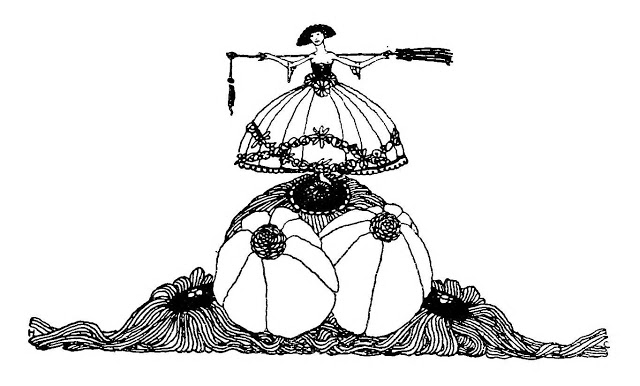
ROUNDABOUTS AND SWINGS
It was early last September nigh to Framlin'amon-Sea,
An''twas Fair-day come to-morrow, an' the time was after tea,
An' I met a painted caravan adown a dusty lane,
A Pharaoh with his waggons cornin' jolt an' creak an' strain;
A cheery cove an' sunburnt, bold o' eye and wrinkled up,
An' beside him on the splashboard sat a brindled tarrier pup,
An' a lurcher wise as Solomon an' lean as fiddle-strings
Was joggin' in the dust along is roundabouts and swings.
"Goo'-day," said'e; "Goo'-day," said I; "an' 'ow d'you find things go,
[Pg 76]An' what's the chance o' millions when you runs a travellin' show?"
"I find," said'e, "things very much as 'ow I've always found,
For mostly they goes up and down or else goes round and round."
Said'e, "The job's the very spit o' what it always were,
It's bread and bacon mostly when the dog don't catch a'are;
But lookin' at it broad, an' while it ain't no merchant king's,
What's lost upon the roundabouts we pulls up on the swings!
"Goo' luck," said'e; "Goo' luck," said I; "you've put it past a doubt;
An' keep that lurcher on the road, the gamekeepers is out";
'E thumped upon the footboard an' 'e lumbered on again
To meet a gold-dust sunset down the owl-light in the lane;
An' the moon she climbed the'azels, while a night-jar seemed to spin
[Pg 77]That Pharaoh's wisdom o'er again, is sooth of lose-and-win;
For "up an' down an' round," said'e, "goes all appointed things,
An' losses on the roundabouts means profits on the swings!"
PATRICK R. CHALMERS
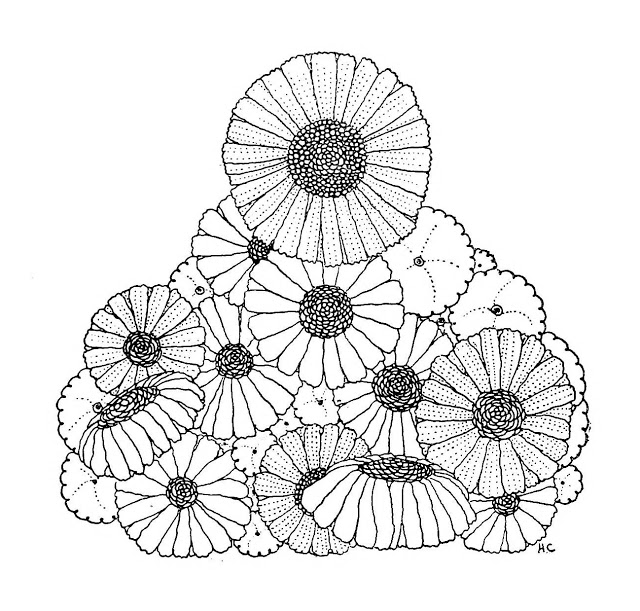
A TOWN WINDOW
Beyond my window in the night
Is but a drab inglorious street,
Yet there the frost and clean starlight
As over Warwick woods are sweet.
Under the grey drift of the town
The crocus works among the mould
As eagerly as those that crown
The Warwick spring in flame and gold.
And when the tramway down the hill
Across the cobbles moans and rings,
There is about my window-sill
The tumult of a thousand wings.
JOHN DRINKWATER
BRUMANA
Oh shall I never never be home again?
Meadows of England shining in the rain
Spread wide your daisied lawns: your ramparts green
With briar fortify, with blossom screen
Till my far morning—and O streams that slow
And pure and deep through plains and playlands go,
For me your love and all your kingcups store,
And—dark militia of the southern shore,
Old fragrant friends—preserve me the last lines
Of that long saga which you sung me, pines,
When, lonely boy, beneath the chosen tree
I listened, with my eyes upon the sea.
[Continued]
JAMES ELROY FLECKER
THE DYING PATRIOT
Day breaks on England down the Kentish hills,
Singing in the silence of the meadow-footing rills,
Day of my dreams, O day!
I saw them march from Dover, long ago,
With a silver cross before them, singing low,
Monks of Rome from their home where the blue seas break in foam,
Augustine with his feet of snow.
Noon strikes on England, noon on Oxford town,
—Beauty she was statue cold—there's blood upon her gown:
Noon of my dreams, O noon!
Proud and godly kings had built her, long ago
With her towers and tombs and statues all arow,
With her fair and floral air and the love that lingers there,
And the streets where the great men go.
Evening on the olden, the golden sea of Wales,
When the first star shivers and the last wave pales:
O evening dreams!
There's a house that Britons walked in, long ago,
Where now the springs of ocean fall and flow,
And the dead robed in red and sea-lilies overhead
Sway when the long winds blow.
Sleep not, my country: though night is here, afar
Your children of the morning are clamorous for war:
Fire in the night, O dreams!
Though she send you as she sent you, long ago,
South to desert, east to ocean, west to snow,
West of these out to seas colder than the Hebrides I must go
Where the fleet of stars is anchored and the young Star-captains glow.
JAMES ELROY FLECKER
NOVEMBER EVES
November Evenings! Damp and still
They used to cloak Leckhampton hill,
And lie down close on the grey plain,
And dim the dripping window-pane,
And send queer winds like Harlequins
That seized our elms for violins
And struck a note so sharp and low
Even a child could feel the woe.
Now fire chased shadow round the room;
Tables and chairs grew vast in gloom:
We crept about like mice, while Nurse
Sat mending, solemn as a hearse,
And even our unlearned eyes
Half closed with choking memories.
Is it the mist or the dead leaves,
Or the dead men—November eves?
JAMES ELROY FLECKER
STAR-TALK
"Are you awake, Gemelli,
This frosty night?"
"We'll be awake till reveille,
Which is Sunrise," say the Gemelli,
"It's no good trying to go to sleep:
If there's wine to be got we'll drink it deep,
But rest is hopeless to-night,
But rest is hopeless to-night."
'Are you cold too, poor Pleiads,
This frosty night?"
"Yes, and so are the Hyads:
See us cuddle and hug," say the Pleiads,
"All six in a ring: it keeps us warm:
We huddle together like birds in a storm:
It's bitter weather to-night,
It's bitter weather to-night."
"What do you hunt, Orion,
This starry night?"
"The Ram, the Bull and the Lion,
[Pg 84]And the Great Bear," says Orion,
"With my starry quiver and beautiful belt
I am trying to find a good thick pelt
To warm my shoulders to-night,
To warm my shoulders to-night."
"Did you hear that, Great She-bear,
This frosty night?"
"Yes, he's talking of stripping me bare,
Of my own big fur," says the She-bear.
"I'm afraid of the man and his terrible arrow:
The thought of it chills my bones to the marrow,
And the frost so cruel to-night!
And the frost so cruel to-night!"
"How is your trade, Aquarius,
This frosty night?"
"Complaints is many and various,
And my feet are cold," says Aquarius,
"There's Venus objects to Dolphin-scales,
And Mars to Crab-spawn found in my pails,
And the pump has frozen to-night,
And the pump has frozen to-night."
ROBERT GRAVES
THE KINGFISHER
It was the Rainbow gave thee birth,
And left thee all her lovely hues;
And, as her mother's name was Tears,
So runs it in thy blood to choose
For haunts the lonely pools, and keep
In company with trees that weep.
Go you and, with such glorious hues,
Live with proud Peacocks in green parks;
On lawns as smooth as shining glass,
Let every feather show its mark;
Get thee on boughs and clap thy wings
Before the windows of proud kings.
Nay, lovely Bird, thou art not vain;
Thou hast no proud ambitious mind;
I also love a quiet place
That's green, away from all mankind;
A lonely pool, and let a tree
Sigh with her bosom over me.
WILLIAM H. DAVIES
SHEEP
When I was once in Baltimore
A man came up to me and cried,
"Come, I have eighteen hundred sheep,
And we will sail on Tuesday's tide.
"If you will sail with me, young man,
I'll pay you fifty shillings down;
These eighteen hundred sheep I take
From Baltimore to Glasgow town."
He paid me fifty shillings down,
I sailed with eighteen hundred sheep;
We soon had cleared the harbour's mouth,
We soon were in the salt sea deep.
The first night we were out at sea
Those sheep were quiet in their mind;
The second night they cried with fear—
[Pg 87]They smelt no pastures in the wind.
They sniffed, poor things, for their green fields,
They cried so loud I could not sleep:
For fifty thousand shillings down
I would not sail again with sheep.
WILLIAM H. DAVIES
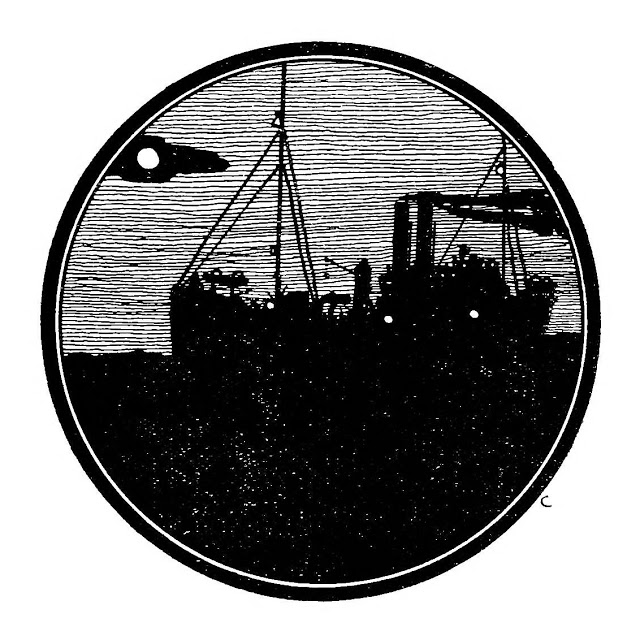
HOME THOUGHTS IN LAVENTIE
Green gardens in Laventie!
Soldiers only know the street
Where the mud is churned and splashed about
By battle-wending feet;
And yet beside one stricken house there is a glimpse of grass,
Look for it when you pass.
Beyond the Church whose pitted spire
Seems balanced on a strand
Of swaying stone and tottering brick
Two roofless ruins stand,
And here behind the wreckage where the back-wall should have been
We found a garden green.
The grass was never trodden on,
[Pg 89]The little path of gravel
Was overgrown with celandine,
No other folk did travel
Along its weedy surface, but the nimble-footed mouse
Running from house to house.
So all among the vivid blades
Of soft and tender grass
We lay, nor heard the limber wheels
That pass and ever pass,
In noisy continuity, until their stony rattle
Seems in itself a battle.
At length we rose up from our ease
Of tranquil happy mind,
And searched the garden's little length
A fresh pleasaunce to find;
And there, some yellow daffodils and jasmine hanging high
Did rest the tired eye.
The fairest and most fragrant
Of the many sweets we found,
Was a little bush of Daphne flower
[Pg 90]
Upon a grassy mound,
And so thick were the blossoms set, and so divine the scent,
That we were well content.
Hungry for Spring I bent my head,
The perfume fanned my face,
And all my soul was dancing
In that lovely little place,
Dancing with a measured step from wrecked and
shattered towns
Away . . . upon the Downs.
I saw green banks of daffodil,
Slim poplars in the breeze,
Great tan-brown hares in gusty March
A-courting on the leas;
And meadows with their glittering streams, and silver
scurrying dace,
Home—what a perfect place!
EDWARD WYNDHAM TENNANT
INTO BATTLE
The naked earth is warm with Spring,
And with green grass and bursting trees
Leans to the sun's gaze glorying,
And quivers in the sunny breeze;
And Life is Colour and Warmth and Light,
And a striving evermore for these;
And he is dead who will not fight;
And who dies fighting has increase.
The fighting man shall from the sun
Take warmth, and life from the glowing earth;
Speed with the light-foot winds to run,
And with the trees to newer birth;
And find, when fighting shall be done,
Great rest, and fullness after dearth.
All the bright company of Heaven
Hold him in their high comradeship,
The Dog-star and the Sisters Seven,
[Pg 92]Orion's Belt and sworded hip.
The woodland trees that stand together,
They stand to him each one a friend,
They gently speak in the windy weather;
They guide to valley and ridges' end.
The kestrel hovering by day,
And the little owls that call by night,
Bid him be swift and keen as they,
As keen of ear, as swift of sight.
The blackbird sings to him, "Brother, brother,
If this be the last song you shall sing
Sing well, for you may not sing another;
Brother, sing."
In dreary, doubtful, waiting hours,
Before the brazen frenzy starts,
The horses show him nobler powers;
O patient eyes, courageous hearts!
And when the burning moment breaks,
And all things else are out of mind,
And only Joy of Battle takes
[Pg 93]Him by the throat, and makes him blind—
Though joy and blindness he shall know,
Not caring much to know, that still,
Nor lead nor steel shall reach him, so
That it be not the Destined Will.
The thundering line of battle stands,
And in the air Death moans and sings;
But Day shall clasp him with strong hands,
And Night shall fold him in soft wings.
JULIAN GRENFELL
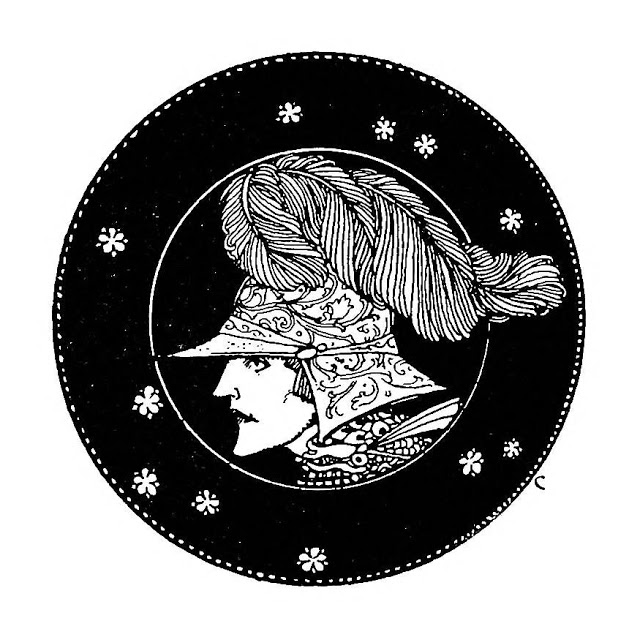
OVERHEARD ON A SALTMARSH
Nymph, nymph, what are your beads?
Green glass, goblin. Why do you stare
at them?
Give them me.
No.
Give them me. Give them me.
No.
Then I will howl all night in the reeds,
Lie in the mud and howl for them.
Goblin, why do you love them so?
They are better than stars or water,
Better than voices of winds that sing,
Better than any man's fair daughter,
Your green glass beads on a silver ring.
Hush, I stole them out of the moon.
[Pg 95][Illustration: "GIVE ME YOUR BEADS. I DESIRE THEM. NO."]
Give me your beads. I desire them.
No.
I will howl in a deep lagoon
For your green glass beads, I love them so.
Give them me. Give them.
No.
HAROLD MONRO
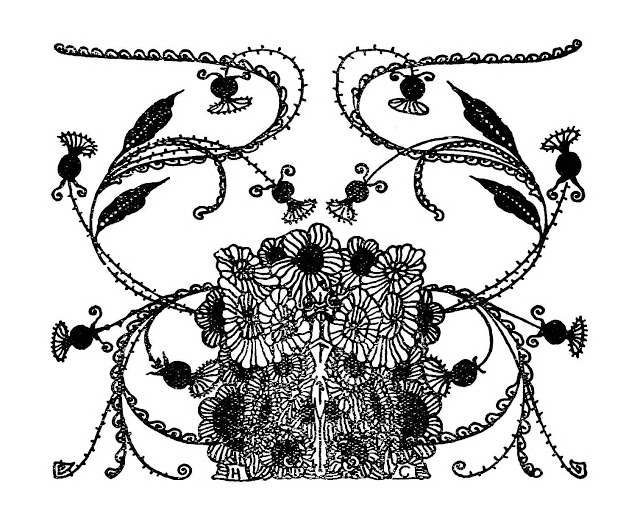
A FLOWER IS LOOKING
THROUGH THE GROUND
A flower is looking through the ground,
Blinking at the April weather;
Now a child has seen the flower:
Now they go and play together.
Now it seems the flower will speak,
And will call the child its brother—
But, oh strange forgetfulness!—
They don't recognize each other.
HAROLD MONRO

MAN CARRYING BALE
The tough hand closes gently on the load;
Out of the mind, a voice
Calls 'Lift!' and the arms, remembering well
their work,
Lengthen and pause for help.
Then a slow ripple flows from head to foot
While all the muscles call to one another:
'Lift!' and the bulging bale
Floats like a butterfly in June.
So moved the earliest carrier of bales,
And the same watchful sun
Glowed through his body feeding it with light.
So will the last one move,
And halt, and dip his head, and lay his load
Down, and the muscles will relax and tremble.
Earth, you designed your man
Beautiful both in labour and repose.
HAROLD MONRO
THE CHERRY TREES
The cherry trees bend over and are shedding
On the old road where all that passed are dead,
Their petals, strewing the grass as for a wedding
This early May morn when there is none to wed.
EDWARD THOMAS
THE BELLS OF HEAVEN
'T Would ring the bells of Heaven
The wildest peal for years,
If Parson lost his senses
And people came to theirs,
And he and they together
Knelt down with angry prayers
For tamed and shabby tigers
And dancing dogs and bears,
And wretched, blind pit ponies,
And little hunted hares.
RALPH HODGSON
THE SONG OF HONOUR
I climbed a hill as light fell short,
And rooks came home in scramble sort,
And filled the trees and flapped and fought
And sang themselves to sleep;
An owl from nowhere with no sound
Swung by and soon was nowhere found,
I heard him calling half-way round,
Holloing loud and deep;
A pair of stars, faint pins of light,
Then many a star, sailed into sight,
And all the stars, the flower of night,
Were round me at a leap;
To tell how still the valleys lay
I heard a watch-dog miles away,
And bells of distant sheep.
I heard no more of bird or bell,
The mastiff in a slumber fell,
I stared into the sky,
As wondering men have always done
Since beauty and the stars were one,
[Pg 101]Though none so hard as I.
It seemed, so still the valleys were,
As if the whole world knelt at prayer,
Save me and me alone;
So pure and wide that silence was
I feared to bend a blade of grass,
And there I stood like stone.
[Continued]
RALPH HODGSON
STUPIDITY STREET>
I saw with open eyes
Singing birds sweet
Sold in the shops
For the people to eat,
Sold in the shops of
Stupidity Street.
I saw in vision
The worm in the wheat,
And in the shops nothing
For people to eat;
Nothing for sale in
Stupidity Street.
RALPH HODGSON
TO THE COMING SPRING
O punctual Spring!
We had forgotten in this winter town
The days of Summer and the long, long eves.
But now you come on airy wing,
With busy fingers spilling baby-leaves
On all the bushes, and a faint green down
On ancient trees, and everywhere
Your warm breath soft with kisses
Stirs the wintry air,
And waking us to unimagined blisses.
Your lightest footprints in the grass
Are marked by painted crocus-flowers
And heavy-headed daffodils,
While little trees blush faintly as you pass.
The morning and the night
You bathe with heavenly showers,
And scatter scentless violets on the rounded hills,
Drop beneath leafless woods pale primrose posies.
With magic key, in the new evening light,
[Pg 104]
You are unlocking buds that keep the roses;
The purple lilac soon will blow above the wall
And bended boughs in orchards whitely bloom—
We had forgotten in the Winter's gloom ...
Soon we shall hear the cuckoo call!
MARGARET MACKENZIE
ALMS IN AUTUMN
Spindle-wood, spindle-wood, will you lend me, pray,
A little flaming lantern to guide me on my way?
The fairies all have vanished from the meadow and the glen,
And I would fain go seeking till I find them once again.
Lend me now a lantern that I may bear a light
To find the hidden pathway in the darkness of the night.
Ash-tree, ash-tree, throw me, if you please,
Throw me down a slender branch of russet-gold keys.
I fear the gates of Fairyland may all be shut so fast
That nothing but your magic keys will ever take me past.
I'll tie them to my girdle, and as I go along
[Pg 106]My heart will find a comfort in the tinkle of their song.
Holly-bush, holly-bush, help me in my task,
A pocketful of berries is all the alms I ask :
A pocketful of berries to thread in golden strands
(I would not go a-visiting with nothing in my hands).
So fine will be the rosy chains, so gay, so glossy bright,
They'll set the realms of Fairyland all dancing with delight.
ROSE FYLEMAN
I DON'T LIKE BEETLES
I don't like beetles, tho' I'm sure they're very good,
I don't like porridge, tho' my Nanna says I should;
I don't like the cistern in the attic where I play,
And the funny noise the bath makes when the water runs away.
I don't like the feeling when my gloves are made of silk,
And that dreadful slimy skinny stuff on top of hot milk;
I don't like tigers, not even in a book,
And, I know it's very naughty, but I don't like Cook!
ROSE FYLEMAN
WISHES
I wish I liked rice pudding,
I wish I were a twin,
I wish some day a real live fairy
Would just come walking in.
I wish when I'm at table
My feet would touch the floor,
I wish our pipes would burst next winter,
Just like they did next door.
I wish that I could whistle
Real proper grown-up tunes,
I wish they'd let me sweep the chimneys
On rainy afternoons.
I've got such heaps of wishes,
I've only said a few;
I wish that I could wake some morning
And find they'd all come true!
ROSE FYLEMAN
VERY NEARLY!
I never quite saw fairy-folk
A-dancing in the glade,
Where, just beyond the hollow oak,
Their broad green rings are laid:
But, while behind that oak I hid,
One day I very nearly did!
I never quite saw mermaids rise
Above the twilight sea,
When sands, left wet,'neath sunset skies,
Are blushing rosily:
But—all alone, those rocks amid—
One night I very nearly did!
I never quite saw Goblin Grim
Who haunts our lumber room
And pops his head above the rim
Of that oak chest's deep gloom:
But once—when Mother raised the lid—
I very, very nearly did!
QUEENIE SCOTT-HOPPER
WHAT THE THRUSH SAYS
Come and see! Come and see!"
The Thrush pipes out of the hawthorn-tree:
And I and Dicky on tiptoe go
To see what treasures he wants to show.
His call is clear as a call can be—
And "Come and see!" he says:
"Come and see!"
"Come and see! Come and see!"
His house is there in the hawthorn-tree:
The neatest house that ever you saw,
Built all of mosses and twigs and straw:
The folk who built were his wife and he—
And "Come and see!" he says:
"Come and see!"
"Come and see! Come and see!"
Within this house there are treasures three:
So warm and snug in its curve they lie—
[Pg 111]Like three bright bits out of Spring's blue sky.
We would not hurt them, he knows; not we!
So "Come and see!" he says:
"Come and see!"
"Come and see! Come and see!"
No thrush was ever so proud as he!
His bright-eyed lady has left those eggs
For just five minutes to stretch her legs.
He's keeping guard in the hawthorn-tree,
And "Come and see!" he says:
"Come and see!"
"Come and see! Come and see!"
He has no fear of the boys and me.
He came and shared in our meals, you know,
In hungry times of the frost and snow.
So now we share in his Secret Tree
Where "Come and see!" he says:
"Come and see!"
QUEENIE SCOTT-HOPPER
THE SUNSET GARDEN
I can see from the window a little brown house,
And the garden goes up to the top of the hill.
And the sun comes each day,
And slips down away
At the end of the garden an' sleeps there ... until
The daylight comes climbing up over the hill.
I do wish I lived in the little brown house,
Then at night I'd go out to the garden, an' creep
Up ... up ... then I'd stop,
An' lean over the top,
At the end of the garden, an' so I could peep,
And see what the sun looks like when it's asleep.
MARION ST JOHN WEBB
SWEET AS THE BREATH OF THE WHIN
Sweet as the breath of the whin
Is the thought of my love—
Sweet as the breath of the whin
In the noonday sun—
Sweet as the breath of the whin
In the sun after rain.
Glad as the gold of the whin
Is the thought of my love—
Glad as the gold of the whin
Since wandering's done—
Glad as the gold of the whin
Is my heart, home again.
WILFRID WILSON GIBSON
THE LAW THE LAWYERS KNOW ABOUT
The law the lawyers know about
Is property and land;
But why the leaves are on the trees,
And why the winds disturb the seas,
Why honey is the food of bees,
Why horses have such tender knees,
Why winters come and rivers freeze,
Why Faith is more than what one sees,
And Hope survives the worst disease,
And Charity is more than these,
They do not understand.
H. D. C. PEPLER
ALL IS SPIRIT AND PART OF ME.
A greater lover none can be,
And all is spirit and part of me.
I am sway of the rolling hills,
And breath from the great wide plains;
I am born of a thousand storms,
And grey with the rushing rains;
I have stood with the age-long rocks,
And flowered with the meadow sweet;
I have fought with the wind-worn firs,
And bent with the ripening wheat;
I have watched with the solemn clouds,
And dreamt with the moorland pools;
I have raced with the water's whirl,
And lain where their anger cools;
I have hovered as strong-winged bird,
And swooped as I saw my prey;
I have risen with cold grey dawn,
And flamed in the dying day;
For all is spirit and part of me,
And greater lover none can be.
L. D'O. WALTERS[Pg 116]
STREET LANTERNS
Country roads are yellow and brown.
We mend the roads in London Town.
Never a hansom dare come nigh,
Never a cart goes rolling by.
An unwonted silence steals
In between the turning wheels.
Quickly ends the autumn day,
And the workman goes his way,
Leaving, midst the traffic rude,
One small isle of solitude,
Lit, throughout the lengthy night,
By the little lantern's light.
Jewels of the dark have we,
Brighter than the rustic's be.
Over the dull earth are thrown
Topaz, and the ruby stone.
MARY E. COLERIDGE
TO BETSEY-JANE, ON HER DESIRING
TO GO INCONTINENTLY TO HEAVEN
My Betsey-Jane, it would not do,
For what would Heaven make of you,
A little, honey-loving bear,
Among the Blessed Babies there?
Nor do you dwell with us in vain
Who tumble and get up again.
And try, with bruised knees, to smile—.
Sweet, you are blessed all the-while
And we in you: so wait, they'll come
To take your hand and fetch you home,
In Heavenly leaves to play at tents
With all the Holy Innocents.
HELEN PARRY EDEN
THE BRIDGE
Here, with one leap,
The bridge that spans the cutting; on its back
The load
Of the main-road,
And under it the railway-track.
Into the plains they sweep,
Into the solitary plains asleep,
The flowing lines, the parallel lines of steel—
Fringed with their narrow grass,
Into the plains they pass,
The flowing lines, like arms of mute appeal.
A cry
Prolonged across the earth—a call
To the remote horizons and the sky;
The whole east-rushes down them with its light,
And the whole west receives them, with its pall
Of stars and night—
[Pg 119]The flowing lines, the parallel lines of steel.
And with the fall
Of darkness, see! the red,
Bright anger of the signal, where it flares
Like a huge eye that stares
On some hid danger in the dark ahead.
A twang of wire—unseen
The signal drops; and now, instead
Of a red eye, a green.
Out of the silence grows
An iron thunder—grows, and roars, and sweeps,
Menacing! The plain
Suddenly leaps,
Startled, from its repose—
Alert and listening. Now, from the gloom
Of the soft distance, loom
Three lights and, over them, a brush
Of tawny flame and flying spark—
Three pointed lights that rush,
Monstrous, upon the cringing dark.
And nearer, nearer rolls the sound,
Louder the throb and roar of wheels,
The shout of speed, the shriek of steam;
The sloping bank,
[Pg 120]Cut into flashing squares, gives back the clank
And grind of metal, while the ground
Shudders and the bridge reels—
As, with a scream,
The train,
A rage of smoke, a laugh of fire,
A lighted anguish of desire,
A dream
Of gold and iron, of sound and flight,
Tumultuous roars across the night.
The train roars past—and, with a cry,
Drowned in a flying howl of wind,
Half-stifled in the smoke and blind,
The plain,
Shaken, exultant, unconfined,
Rises, flows on, and follows, and sweeps by,
Shrieking, to lose itself in distance and the sky.
J. REDWOOD ANDERSON
FEBRUARY
The robin on my lawn
He was the first to tell
How, in the frozen dawn,
This miracle befell,
Waking the meadows white
With hoar, the iron road
Agleam with splintered light,
And ice where water flowed:
Till, when the low sun drank
Those milky mists that cloak
Hanger and hollied bank,
The winter world awoke
To hear the feeble bleat
Of lambs on downland farms:
A blackbird whistled sweet;
Old beeches moved their arms
Into a mellow haze
Aerial, newly-born:
And I, alone, agaze,
[Pg 122]Stood waiting for the thorn
To break in blossom white,
Or burst in a green flame....
So, in a single night,
Fair February came,
Bidding my lips to sing
Or whisper their surprise,
With all the joy of spring
And morning in her eyes.
FRANCIS BRETT YOUNG
SEA-FOAM
A fleck of foam on the shining sand,
Left by the ebbing sea,
But richer than man may understand
In magic and mystery—
Transient bubbles rainbow-bright,
Myriad-hued and strange,
Tremble and throb in the noonday light,
Flower and flush and change.
A million tides have come and gone,
Great gales of autumn and spring,
A million summoning moons have shone
To bring to birth this thing—
A foam-fleck left on the ribbed wet sand
By the wave of an outgoing sea,
With all the colour of Faeryland,
Wonder and mystery.
TERESA HOOLEY
A PETITION
All that a man might ask, thou hast given me, England,
Birth-right and happy childhood's long heart's-ease,
And love whose range is deep beyond all sounding
And wider than all seas.
A heart to front the world and find God in it,
Eyes blind enow, but not too blind to see
The lovely things behind the dross and darkness,
And lovelier things to be.
And friends whose loyalty time nor death shall weaken,
And quenchless hope and laughter's golden store;
All that a man might ask thou hast given me, England,
[Pg 125]Yet grant thou one thing more:
That now when envious foes would spoil thy splendour,
Unversed in arms, a dreamer such as I
May in thy ranks be deemed not all unworthy,
England, for thee to die.
R. E. VERNÈDE
BLACK AND WHITE
I met a man along the road
To Withernsea;
Was ever anything so dark, so pale
As he?
His hat, his clothes, his tie, his boots
Were black as black
Could be,
And midst of all was a cold white face,
And eyes that looked wearily.
The road was bleak and straight and flat
To Withernsea,
Gaunt poles with shrilling wires their weird
Did dree;
On the sky stood out, on the swollen sky
The black blood veins
Of tree
After tree, as they beat from the face
Of the wind which they could not flee.
And in the fields along the road
To Withernsea,
Swart crows sat huddled on the ground
Disconsolately,
While overhead the seamews wheeled, and skirled
In glee;
But the black cows stood, and cropped where
they stood,
And never heeded thee,
O dark pale man, with the weary eyes,
On the road to Withernsea.
H. H. ABBOTT
THE OXEN
Christmas Eve, and twelve of the clock.
"Now they are all on their knees,"
An elder said as we sat in a flock
By the embers in hearthside ease.
We pictured the meek mild creatures where
They dwelt in their strawy pen,
Nor did it occur to one of us there
To doubt they were kneeling then.
So fair a fancy few believe
In these years! Yet, I feel,
If someone said on Christmas Eve
"Come; see the oxen kneel
In the lonely barton by yonder coomb
Our childhood used to know,"
I should go with him in the gloom,
Hoping it might be so.
THOMAS HARDY
End of the Project Gutenberg EBook of The Year's at the Spring, by Various
*** END OF THIS PROJECT GUTENBERG EBOOK THE YEAR'S AT THE SPRING ***
***** This file should be named 51488-h.htm or 51488-h.zip *****
This and all associated files of various formats will be found in:
http://www.gutenberg.org/5/1/4/8/51488/
Produced by Annemie Arnst and Marc D'Hooghe at
http://www.freeliterature.org (Images generously made
available by the Internet Archive)
Updated editions will replace the previous one--the old editions will
be renamed.
Creating the works from print editions not protected by U.S. copyright
law means that no one owns a United States copyright in these works,
so the Foundation (and you!) can copy and distribute it in the United
States without permission and without paying copyright
royalties. Special rules, set forth in the General Terms of Use part
of this license, apply to copying and distributing Project
Gutenberg-tm electronic works to protect the PROJECT GUTENBERG-tm
concept and trademark. Project Gutenberg is a registered trademark,
and may not be used if you charge for the eBooks, unless you receive
specific permission. If you do not charge anything for copies of this
eBook, complying with the rules is very easy. You may use this eBook
for nearly any purpose such as creation of derivative works, reports,
performances and research. They may be modified and printed and given
away--you may do practically ANYTHING in the United States with eBooks
not protected by U.S. copyright law. Redistribution is subject to the
trademark license, especially commercial redistribution.
START: FULL LICENSE
THE FULL PROJECT GUTENBERG LICENSE
PLEASE READ THIS BEFORE YOU DISTRIBUTE OR USE THIS WORK
To protect the Project Gutenberg-tm mission of promoting the free
distribution of electronic works, by using or distributing this work
(or any other work associated in any way with the phrase "Project
Gutenberg"), you agree to comply with all the terms of the Full
Project Gutenberg-tm License available with this file or online at
www.gutenberg.org/license.
Section 1. General Terms of Use and Redistributing Project
Gutenberg-tm electronic works
1.A. By reading or using any part of this Project Gutenberg-tm
electronic work, you indicate that you have read, understand, agree to
and accept all the terms of this license and intellectual property
(trademark/copyright) agreement. If you do not agree to abide by all
the terms of this agreement, you must cease using and return or
destroy all copies of Project Gutenberg-tm electronic works in your
possession. If you paid a fee for obtaining a copy of or access to a
Project Gutenberg-tm electronic work and you do not agree to be bound
by the terms of this agreement, you may obtain a refund from the
person or entity to whom you paid the fee as set forth in paragraph
1.E.8.
1.B. "Project Gutenberg" is a registered trademark. It may only be
used on or associated in any way with an electronic work by people who
agree to be bound by the terms of this agreement. There are a few
things that you can do with most Project Gutenberg-tm electronic works
even without complying with the full terms of this agreement. See
paragraph 1.C below. There are a lot of things you can do with Project
Gutenberg-tm electronic works if you follow the terms of this
agreement and help preserve free future access to Project Gutenberg-tm
electronic works. See paragraph 1.E below.
1.C. The Project Gutenberg Literary Archive Foundation ("the
Foundation" or PGLAF), owns a compilation copyright in the collection
of Project Gutenberg-tm electronic works. Nearly all the individual
works in the collection are in the public domain in the United
States. If an individual work is unprotected by copyright law in the
United States and you are located in the United States, we do not
claim a right to prevent you from copying, distributing, performing,
displaying or creating derivative works based on the work as long as
all references to Project Gutenberg are removed. Of course, we hope
that you will support the Project Gutenberg-tm mission of promoting
free access to electronic works by freely sharing Project Gutenberg-tm
works in compliance with the terms of this agreement for keeping the
Project Gutenberg-tm name associated with the work. You can easily
comply with the terms of this agreement by keeping this work in the
same format with its attached full Project Gutenberg-tm License when
you share it without charge with others.
1.D. The copyright laws of the place where you are located also govern
what you can do with this work. Copyright laws in most countries are
in a constant state of change. If you are outside the United States,
check the laws of your country in addition to the terms of this
agreement before downloading, copying, displaying, performing,
distributing or creating derivative works based on this work or any
other Project Gutenberg-tm work. The Foundation makes no
representations concerning the copyright status of any work in any
country outside the United States.
1.E. Unless you have removed all references to Project Gutenberg:
1.E.1. The following sentence, with active links to, or other
immediate access to, the full Project Gutenberg-tm License must appear
prominently whenever any copy of a Project Gutenberg-tm work (any work
on which the phrase "Project Gutenberg" appears, or with which the
phrase "Project Gutenberg" is associated) is accessed, displayed,
performed, viewed, copied or distributed:
This eBook is for the use of anyone anywhere in the United States and
most other parts of the world at no cost and with almost no
restrictions whatsoever. You may copy it, give it away or re-use it
under the terms of the Project Gutenberg License included with this
eBook or online at www.gutenberg.org. If you are not located in the
United States, you'll have to check the laws of the country where you
are located before using this ebook.
1.E.2. If an individual Project Gutenberg-tm electronic work is
derived from texts not protected by U.S. copyright law (does not
contain a notice indicating that it is posted with permission of the
copyright holder), the work can be copied and distributed to anyone in
the United States without paying any fees or charges. If you are
redistributing or providing access to a work with the phrase "Project
Gutenberg" associated with or appearing on the work, you must comply
either with the requirements of paragraphs 1.E.1 through 1.E.7 or
obtain permission for the use of the work and the Project Gutenberg-tm
trademark as set forth in paragraphs 1.E.8 or 1.E.9.
1.E.3. If an individual Project Gutenberg-tm electronic work is posted
with the permission of the copyright holder, your use and distribution
must comply with both paragraphs 1.E.1 through 1.E.7 and any
additional terms imposed by the copyright holder. Additional terms
will be linked to the Project Gutenberg-tm License for all works
posted with the permission of the copyright holder found at the
beginning of this work.
1.E.4. Do not unlink or detach or remove the full Project Gutenberg-tm
License terms from this work, or any files containing a part of this
work or any other work associated with Project Gutenberg-tm.
1.E.5. Do not copy, display, perform, distribute or redistribute this
electronic work, or any part of this electronic work, without
prominently displaying the sentence set forth in paragraph 1.E.1 with
active links or immediate access to the full terms of the Project
Gutenberg-tm License.
1.E.6. You may convert to and distribute this work in any binary,
compressed, marked up, nonproprietary or proprietary form, including
any word processing or hypertext form. However, if you provide access
to or distribute copies of a Project Gutenberg-tm work in a format
other than "Plain Vanilla ASCII" or other format used in the official
version posted on the official Project Gutenberg-tm web site
(www.gutenberg.org), you must, at no additional cost, fee or expense
to the user, provide a copy, a means of exporting a copy, or a means
of obtaining a copy upon request, of the work in its original "Plain
Vanilla ASCII" or other form. Any alternate format must include the
full Project Gutenberg-tm License as specified in paragraph 1.E.1.
1.E.7. Do not charge a fee for access to, viewing, displaying,
performing, copying or distributing any Project Gutenberg-tm works
unless you comply with paragraph 1.E.8 or 1.E.9.
1.E.8. You may charge a reasonable fee for copies of or providing
access to or distributing Project Gutenberg-tm electronic works
provided that
* You pay a royalty fee of 20% of the gross profits you derive from
the use of Project Gutenberg-tm works calculated using the method
you already use to calculate your applicable taxes. The fee is owed
to the owner of the Project Gutenberg-tm trademark, but he has
agreed to donate royalties under this paragraph to the Project
Gutenberg Literary Archive Foundation. Royalty payments must be paid
within 60 days following each date on which you prepare (or are
legally required to prepare) your periodic tax returns. Royalty
payments should be clearly marked as such and sent to the Project
Gutenberg Literary Archive Foundation at the address specified in
Section 4, "Information about donations to the Project Gutenberg
Literary Archive Foundation."
* You provide a full refund of any money paid by a user who notifies
you in writing (or by e-mail) within 30 days of receipt that s/he
does not agree to the terms of the full Project Gutenberg-tm
License. You must require such a user to return or destroy all
copies of the works possessed in a physical medium and discontinue
all use of and all access to other copies of Project Gutenberg-tm
works.
* You provide, in accordance with paragraph 1.F.3, a full refund of
any money paid for a work or a replacement copy, if a defect in the
electronic work is discovered and reported to you within 90 days of
receipt of the work.
* You comply with all other terms of this agreement for free
distribution of Project Gutenberg-tm works.
1.E.9. If you wish to charge a fee or distribute a Project
Gutenberg-tm electronic work or group of works on different terms than
are set forth in this agreement, you must obtain permission in writing
from both the Project Gutenberg Literary Archive Foundation and The
Project Gutenberg Trademark LLC, the owner of the Project Gutenberg-tm
trademark. Contact the Foundation as set forth in Section 3 below.
1.F.
1.F.1. Project Gutenberg volunteers and employees expend considerable
effort to identify, do copyright research on, transcribe and proofread
works not protected by U.S. copyright law in creating the Project
Gutenberg-tm collection. Despite these efforts, Project Gutenberg-tm
electronic works, and the medium on which they may be stored, may
contain "Defects," such as, but not limited to, incomplete, inaccurate
or corrupt data, transcription errors, a copyright or other
intellectual property infringement, a defective or damaged disk or
other medium, a computer virus, or computer codes that damage or
cannot be read by your equipment.
1.F.2. LIMITED WARRANTY, DISCLAIMER OF DAMAGES - Except for the "Right
of Replacement or Refund" described in paragraph 1.F.3, the Project
Gutenberg Literary Archive Foundation, the owner of the Project
Gutenberg-tm trademark, and any other party distributing a Project
Gutenberg-tm electronic work under this agreement, disclaim all
liability to you for damages, costs and expenses, including legal
fees. YOU AGREE THAT YOU HAVE NO REMEDIES FOR NEGLIGENCE, STRICT
LIABILITY, BREACH OF WARRANTY OR BREACH OF CONTRACT EXCEPT THOSE
PROVIDED IN PARAGRAPH 1.F.3. YOU AGREE THAT THE FOUNDATION, THE
TRADEMARK OWNER, AND ANY DISTRIBUTOR UNDER THIS AGREEMENT WILL NOT BE
LIABLE TO YOU FOR ACTUAL, DIRECT, INDIRECT, CONSEQUENTIAL, PUNITIVE OR
INCIDENTAL DAMAGES EVEN IF YOU GIVE NOTICE OF THE POSSIBILITY OF SUCH
DAMAGE.
1.F.3. LIMITED RIGHT OF REPLACEMENT OR REFUND - If you discover a
defect in this electronic work within 90 days of receiving it, you can
receive a refund of the money (if any) you paid for it by sending a
written explanation to the person you received the work from. If you
received the work on a physical medium, you must return the medium
with your written explanation. The person or entity that provided you
with the defective work may elect to provide a replacement copy in
lieu of a refund. If you received the work electronically, the person
or entity providing it to you may choose to give you a second
opportunity to receive the work electronically in lieu of a refund. If
the second copy is also defective, you may demand a refund in writing
without further opportunities to fix the problem.
1.F.4. Except for the limited right of replacement or refund set forth
in paragraph 1.F.3, this work is provided to you 'AS-IS', WITH NO
OTHER WARRANTIES OF ANY KIND, EXPRESS OR IMPLIED, INCLUDING BUT NOT
LIMITED TO WARRANTIES OF MERCHANTABILITY OR FITNESS FOR ANY PURPOSE.
1.F.5. Some states do not allow disclaimers of certain implied
warranties or the exclusion or limitation of certain types of
damages. If any disclaimer or limitation set forth in this agreement
violates the law of the state applicable to this agreement, the
agreement shall be interpreted to make the maximum disclaimer or
limitation permitted by the applicable state law. The invalidity or
unenforceability of any provision of this agreement shall not void the
remaining provisions.
1.F.6. INDEMNITY - You agree to indemnify and hold the Foundation, the
trademark owner, any agent or employee of the Foundation, anyone
providing copies of Project Gutenberg-tm electronic works in
accordance with this agreement, and any volunteers associated with the
production, promotion and distribution of Project Gutenberg-tm
electronic works, harmless from all liability, costs and expenses,
including legal fees, that arise directly or indirectly from any of
the following which you do or cause to occur: (a) distribution of this
or any Project Gutenberg-tm work, (b) alteration, modification, or
additions or deletions to any Project Gutenberg-tm work, and (c) any
Defect you cause.
Section 2. Information about the Mission of Project Gutenberg-tm
Project Gutenberg-tm is synonymous with the free distribution of
electronic works in formats readable by the widest variety of
computers including obsolete, old, middle-aged and new computers. It
exists because of the efforts of hundreds of volunteers and donations
from people in all walks of life.
Volunteers and financial support to provide volunteers with the
assistance they need are critical to reaching Project Gutenberg-tm's
goals and ensuring that the Project Gutenberg-tm collection will
remain freely available for generations to come. In 2001, the Project
Gutenberg Literary Archive Foundation was created to provide a secure
and permanent future for Project Gutenberg-tm and future
generations. To learn more about the Project Gutenberg Literary
Archive Foundation and how your efforts and donations can help, see
Sections 3 and 4 and the Foundation information page at
www.gutenberg.org
Section 3. Information about the Project Gutenberg Literary Archive Foundation
The Project Gutenberg Literary Archive Foundation is a non profit
501(c)(3) educational corporation organized under the laws of the
state of Mississippi and granted tax exempt status by the Internal
Revenue Service. The Foundation's EIN or federal tax identification
number is 64-6221541. Contributions to the Project Gutenberg Literary
Archive Foundation are tax deductible to the full extent permitted by
U.S. federal laws and your state's laws.
The Foundation's principal office is in Fairbanks, Alaska, with the
mailing address: PO Box 750175, Fairbanks, AK 99775, but its
volunteers and employees are scattered throughout numerous
locations. Its business office is located at 809 North 1500 West, Salt
Lake City, UT 84116, (801) 596-1887. Email contact links and up to
date contact information can be found at the Foundation's web site and
official page at www.gutenberg.org/contact
For additional contact information:
Dr. Gregory B. Newby
Chief Executive and Director
gbnewby@pglaf.org
Section 4. Information about Donations to the Project Gutenberg
Literary Archive Foundation
Project Gutenberg-tm depends upon and cannot survive without wide
spread public support and donations to carry out its mission of
increasing the number of public domain and licensed works that can be
freely distributed in machine readable form accessible by the widest
array of equipment including outdated equipment. Many small donations
($1 to $5,000) are particularly important to maintaining tax exempt
status with the IRS.
The Foundation is committed to complying with the laws regulating
charities and charitable donations in all 50 states of the United
States. Compliance requirements are not uniform and it takes a
considerable effort, much paperwork and many fees to meet and keep up
with these requirements. We do not solicit donations in locations
where we have not received written confirmation of compliance. To SEND
DONATIONS or determine the status of compliance for any particular
state visit www.gutenberg.org/donate
While we cannot and do not solicit contributions from states where we
have not met the solicitation requirements, we know of no prohibition
against accepting unsolicited donations from donors in such states who
approach us with offers to donate.
International donations are gratefully accepted, but we cannot make
any statements concerning tax treatment of donations received from
outside the United States. U.S. laws alone swamp our small staff.
Please check the Project Gutenberg Web pages for current donation
methods and addresses. Donations are accepted in a number of other
ways including checks, online payments and credit card donations. To
donate, please visit: www.gutenberg.org/donate
Section 5. General Information About Project Gutenberg-tm electronic works.
Professor Michael S. Hart was the originator of the Project
Gutenberg-tm concept of a library of electronic works that could be
freely shared with anyone. For forty years, he produced and
distributed Project Gutenberg-tm eBooks with only a loose network of
volunteer support.
Project Gutenberg-tm eBooks are often created from several printed
editions, all of which are confirmed as not protected by copyright in
the U.S. unless a copyright notice is included. Thus, we do not
necessarily keep eBooks in compliance with any particular paper
edition.
Most people start at our Web site which has the main PG search
facility: www.gutenberg.org
This Web site includes information about Project Gutenberg-tm,
including how to make donations to the Project Gutenberg Literary
Archive Foundation, how to help produce our new eBooks, and how to
subscribe to our email newsletter to hear about new eBooks.